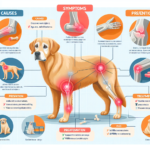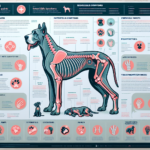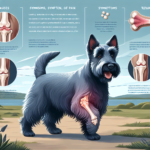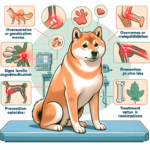Chihuahua Joint Pain: Causes, Symptoms, Prevention, and Treatment
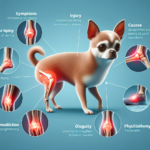
Introduction
Chihuahuas, the smallest breed of dog, have a rich history and distinctive characteristics that make them a beloved pet worldwide. Originating from Mexico, these tiny dogs are known for their large personalities, loyalty, and long lifespans, often reaching up to 15 years or more. Despite their small size, Chihuahuas are energetic and alert, making them excellent companions.
However, like all breeds, Chihuahuas are prone to certain health issues. Among these, joint pain is a significant concern. Joint health is crucial for Chihuahuas due to their active nature and the physical stress their small frames endure. Understanding the causes, symptoms, prevention, and treatment of joint pain in Chihuahuas can help owners ensure their pets lead comfortable and healthy lives.
Breed-Specific Joint Pain Risks
Genetic Predisposition
Chihuahuas, like many purebred dogs, have a genetic predisposition to certain joint-related issues. Hip dysplasia, although more common in larger breeds, can also affect Chihuahuas. This condition occurs when the hip joint doesn’t fit properly into the hip socket, leading to pain and arthritis over time. Additionally, Chihuahuas are susceptible to patellar luxation, where the kneecap dislocates from its normal position, causing discomfort and mobility issues.
Age-Related Risks
As Chihuahuas age, the risk of joint pain increases. Arthritis is a common age-related condition that affects many older dogs, including Chihuahuas. This degenerative joint disease causes inflammation and pain in the joints, leading to decreased mobility. Owners should be vigilant as their Chihuahuas reach middle age, typically around 7-8 years, and monitor for signs of joint discomfort.
Activity Level and Joint Stress
Chihuahuas are known for their high energy levels and playful nature. While regular exercise is essential for their overall health, excessive activity or high-impact exercises can put stress on their joints. Activities such as jumping from heights or running on hard surfaces can exacerbate joint issues, especially in dogs with a genetic predisposition to joint problems.
Common Symptoms of Joint Pain in Chihuahuas
General Symptoms
Owners should be aware of common symptoms of joint pain in Chihuahuas, which include:
- Limping: A noticeable limp or favoring one leg over another.
- Stiffness: Difficulty moving, especially after resting or sleeping.
- Reluctance to Move: Hesitation to jump, climb stairs, or engage in usual activities.
- Swelling: Visible swelling around the joints.
- Behavioral Changes: Increased irritability or signs of discomfort when touched.
Breed-Specific Symptoms
In Chihuahuas, joint pain may manifest in specific ways due to their size and build. For instance, they might show a pronounced “bunny hop” gait when walking or running, which can indicate patellar luxation. Additionally, due to their small size, even minor changes in their movement or behavior can be more noticeable compared to larger breeds.
When to Consult a Vet
If a Chihuahua exhibits any of the above symptoms, it is crucial to consult a veterinarian promptly. Early diagnosis and intervention can prevent further deterioration and improve the dog’s quality of life. Persistent limping, severe stiffness, or any signs of pain should not be ignored.
Preventive Measures for Joint Health
Exercise Recommendations
Regular, low-impact exercise is essential for maintaining joint health in Chihuahuas. Activities such as short walks, gentle play, and swimming can help keep their joints flexible without causing excessive stress. Avoid high-impact activities like jumping from furniture or running on hard surfaces.
Dietary Suggestions
A balanced diet rich in essential nutrients can support joint health. Foods containing glucosamine and chondroitin can help maintain cartilage health. Omega-3 fatty acids, found in fish oil supplements, have anti-inflammatory properties that can alleviate joint pain. Consult a veterinarian for specific dietary recommendations tailored to your Chihuahua’s needs.
Weight Management
Maintaining a healthy weight is crucial for reducing joint stress. Excess weight can exacerbate joint problems and lead to additional health issues. Monitor your Chihuahua’s weight and adjust their diet and exercise routine as needed to keep them at an optimal weight.
Early Screening and Monitoring
Regular veterinary check-ups are essential for early detection of joint issues. Screening tests such as X-rays can help identify problems before they become severe. Monitoring your Chihuahua’s movement and behavior can also provide early clues to potential joint pain.
Treatment Options for Joint Pain
Non-Surgical Treatments
For mild to moderate joint pain, non-surgical treatments can be effective. These include:
- Medications: Anti-inflammatory drugs and pain relievers prescribed by a veterinarian.
- Physical Therapy: Exercises and treatments designed to improve joint function and reduce pain.
- Lifestyle Adjustments: Modifying activity levels and providing supportive bedding.
Surgical Options
In severe cases, surgical intervention may be necessary. Common surgeries for joint pain in Chihuahuas include:
- Patellar Luxation Surgery: Correcting the dislocation of the kneecap.
- Hip Dysplasia Surgery: Procedures such as femoral head ostectomy (FHO) or total hip replacement.
Surgery should be considered after thorough consultation with a veterinarian and evaluation of the dog’s overall health.
Alternative Therapies
Alternative treatments can complement traditional methods and provide additional relief. These include:
- Acupuncture: Using needles to stimulate specific points on the body to relieve pain.
- Hydrotherapy: Water-based exercises that reduce joint stress while improving mobility.
- Massage: Gentle massage techniques to alleviate muscle tension and improve circulation.
Lifestyle and Management Tips
Daily Care Routine
A consistent daily care routine can help manage joint pain in Chihuahuas. This might include:
- Short, gentle walks to maintain mobility.
- Providing a comfortable, supportive bed.
- Administering prescribed medications and supplements.
- Regularly monitoring for changes in behavior or movement.
Modifying the Home Environment
Making the home environment more comfortable can significantly improve a Chihuahua’s quality of life. Consider the following modifications:
- Using ramps or steps to help them access furniture without jumping.
- Providing orthopedic beds to support their joints.
- Ensuring food and water bowls are at a comfortable height.
Long-Term Management
Long-term management of joint pain involves ongoing care and adjustments. Regular veterinary check-ups, maintaining a healthy weight, and adapting exercise routines as needed are crucial. Owners should remain vigilant and responsive to their Chihuahua’s needs to ensure they remain active and happy.
FAQs About Chihuahuas and Joint Pain
What are the early signs of joint pain in Chihuahuas?
Early signs include limping, stiffness, reluctance to move, and behavioral changes such as irritability or discomfort when touched.
Can joint pain in Chihuahuas be prevented?
While genetic predispositions cannot be entirely prevented, maintaining a healthy weight, providing a balanced diet, and ensuring regular, low-impact exercise can significantly reduce the risk of joint pain.
Are there specific foods that can help with joint health?
Yes, foods rich in glucosamine, chondroitin, and omega-3 fatty acids can support joint health. Consult a veterinarian for specific dietary recommendations.
When should I consult a vet about my Chihuahua’s joint pain?
If you notice persistent limping, severe stiffness, or any signs of pain, it is essential to consult a veterinarian promptly for diagnosis and treatment.
What are the best exercises for a Chihuahua with joint pain?
Low-impact exercises such as short walks and swimming are ideal. Avoid high-impact activities that can stress the joints.
Conclusion
Joint pain is a significant concern for Chihuahuas, but with proper care and attention, it can be managed effectively. Understanding the causes, symptoms, prevention, and treatment options is crucial for ensuring your Chihuahua leads a comfortable and active life. Regular veterinary check-ups, a balanced diet, appropriate exercise, and a supportive home environment are key to maintaining your Chihuahua’s joint health. By taking proactive measures and consulting with your veterinarian, you can help your Chihuahua enjoy a happy, pain-free life.

